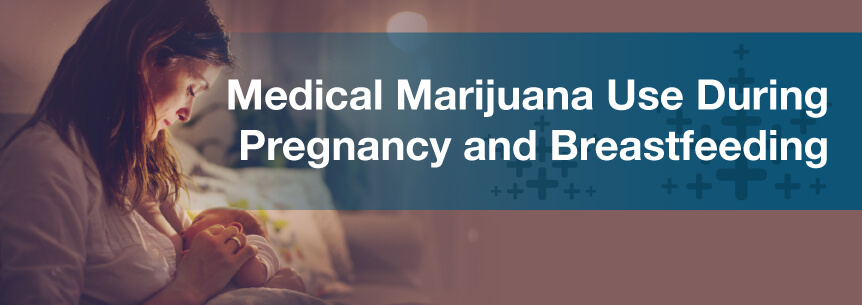
During pregnancy, mothers are encouraged to take steps to keep themselves in optimal health. Obstetricians give expecting moms advice about healthy eating, exercise and things they should avoid during pregnancy to ensure that their baby is as healthy as possible. At the top of the list of what not to do are tobacco, alcohol and marijuana, which are considered big no-no’s that can cause considerable harm to a developing fetus. But should cannabis be lumped in with that group?
Many advocates of alternative medicines like medical marijuana say there’s not enough research to condone cannabis during pregnancy.
However, even if a mother avoids using medical cannabis during pregnancy, can she use it after her baby is born? Will there be adverse effects on the baby? New mothers who have just had their baby are also told to avoid marijuana-use, as THC and the other cannabinoids in cannabis can be passed along through their milk during breastfeeding. But even those who are ardently opposed to breastfeeding mothers using marijuana admit that there is not enough research to confidently back up their stance.
Using marijuana while pregnant or nursing is a hot-button issue. There are valid reasons why expecting and new mothers desire to continue their medical marijuana use. Some have serious health issues that they treat with cannabis. Others are struggling with severe morning sickness, which is preventing them from keeping food down and giving vital nutrients to the baby.
Ardent voices are on both sides of this issue with research and facts to back up their stances. However, if you’re concerned about the health and well-being of your baby, you should take the time to be fully educated on it before deciding one way or the other. Valuable information comes from both camps, and it will give you some food for thought. Here, we’ll discuss the use of medical marijuana during pregnancy and while breastfeeding. We’ll touch on both sides of the issue in the hope of giving you some clarity.
Pregnancy is an amazing biological process that comes naturally to women’s bodies. But so many environmental factors can impact the health of a fetus, from our habits to how we live our lives from day to day. Researchers are realizing just how crucial these actions that we take for granted are and how they affect both the child growing inside of us and our own bodies. Many things play a role in creating a healthy fetus, including:
Simple factors like anxiety levels can affect fetal development. If a woman experiences stress while pregnant, the hormones and stress chemicals released can cause a child to be more prone to stress. Examples like this just go to show us how little we understand the intricacies of pregnancy.
No wonder there’s no definitive answer when it comes to the use of medical marijuana during pregnancy. That’s why most experts say to err on the side of caution and stay away from pot during this time. However, for some mothers, marijuana is an essential alternative medicine that they use to stay on top of their debilitating condition.
Cannabis is an all-natural alternative to many mainstream medications. Because it works so effectively with our endocannabinoid system to fight symptoms like pain, nausea, seizures and a slew of others, states across America are legalizing it for medical purposes. Millions of citizens are finding relief from a variety of different conditions.
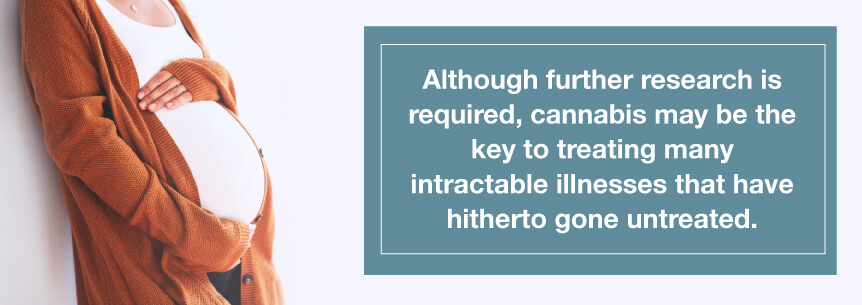
Although further research is required, cannabis may be the key to treating many intractable illnesses that have hitherto gone untreated. Maybe that’s why the use of marijuana among pregnant women has grown from 2.4 percent to almost four percent in recent years.
For this reason, it’s difficult for a pregnant woman to give up medical marijuana when she finds out she is expecting. However, like all mothers, she wants to do what’s best for her baby and not put anything inside her that could harm the fetus. That’s why she must weigh all the options to determine what the best course of action is, both for her own health and for that of the child.
The core of the debate about using medical marijuana during pregnancy is its safety. Will taking cannabis medications harm the growing fetus? The most prevalent position is that the use of marijuana during pregnancy will hurt the baby. The fetus, especially during the few months of pregnancy, is prone to outside forces and will be exposed to everything the mother ingests. Those against medical marijuana use for pregnant woman fear that the baby will have an unhealthy reaction to the THC present in cannabis.
It’s known that THC, the psychoactive component found in marijuana, can cross the placental border. But what is unclear is the effect this cannabinoid can have on a developing human fetus. Many fear that it could put the mother at risk for complications with her pregnancy, such as anemia, and that it will harm the baby’s development.
Just as cannabis affects our endocannabinoid system (ECS), some researchers believe that it also affects the growing child’s ECS. The ECS is intrinsic to our body’s central nervous system, and as that vital network develops, the ECS is present right along with it. It’s believed that the ECS helps form the intricate neural circuitry in early brain growth. Professionals fear that marijuana interferes with this process and can inhibit neural development.
Some of the symptoms in children believed to be associated with prenatal cannabis use include:
Further studies conducted on mice showed that fetuses exposed to marijuana suffered from birth defects like:
However, there has been no clear tie to link human birth defects with cannabis use.
On the opposite end of the spectrum are those who believe that cannabis has no ill effects on babies, either while in utero or after they are born. Marijuana is an all-natural medication, and unlike alcohol and tobacco, it’s not laced with harmful chemicals. Those who advocate its safety point to the fact that cannabis has carried a negative stigma for decades, but before that, was used for its medical properties for hundreds of years.
Those who believe in medical marijuana’s safety do not contradict the evidence that has arisen from researchers against prenatal cannabis use, but they think that there’s more to it than that. Many of the women used for these studies are from low socio-economic backgrounds. A variety of other factors could contribute to the symptoms experienced by the newborns mentioned in these studies, such as:
A 1980s study was conducted in rural Jamaica comparing babies whose mothers were known to have used cannabis while pregnant to those who did not. Researchers tested these children on the third day after birth and one month later. It showed that there was no difference between the babies in cognitive function and response to stimuli.
Five years after the initial study was conducted, researchers followed up with the children. There was no difference in ability between those who had been exposed to cannabis in utero and those who had not. The only differences were found to be from basic school training and the children’s home environment.
For those who use marijuana medicinally, this is a touchy subject. Of course, you want to do what’s right for your child, but you also need to consider your own health and wellbeing. If medical cannabis keeps your symptoms at bay and helps combat the negative aspects of your condition, then you’ll want to deliberate whether or not you can do without it during your pregnancy. Marijuana use should be something you weigh, similar to other variables like taking other medications, drinking coffee and eating fatty foods.
Even if you haven’t used medical marijuana prior to pregnancy, severe morning sickness or nausea actually induces some expecting mothers to begin treating themselves with cannabis. It’s antiemetic properties combat both nausea and vomiting. This potential may be an additional benefit for expecting moms, as it’s essential that they’re able to retain proper nutrition to assist the rapidly growing fetus. This solution may be especially beneficial for women with hyperemesis gravidarum, a rare form of morning sickness that can lead to persistent vomiting, dehydration, malnutrition and hospitalization for IV fluids.
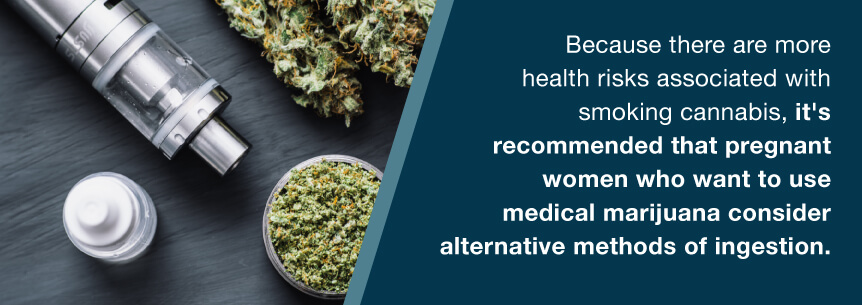
Because there are more health risks associated with smoking cannabis, it’s recommended that pregnant women who want to use medical marijuana consider alternative methods of ingestion. Vaporization, edibles and tinctures can all be employed without burning the cannabis, which causes the mother to inhale smoke that could be harmful to both her and her child.
Although there’s evidence on both sides of the issue, both for and against marijuana use during pregnancy, it’s difficult to determine the efficacy of these opinions because of a lack of research. Marijuana’s status as a schedule I drug puts restraints on the number of studies that can be performed in the U.S. Until further research is conducted, mothers to be will have to use their best judgment based on the evidence available and the advice of their physicians.
Much like medical marijuana and pregnancy, there’s a lack of information about the effects cannabis can have on a nursing infant. The American College of Obstetricians and Gynecologists has recommended that mothers who breastfeed their babies abstain from marijuana use. However, this recommendation is based purely on the fact that there’s insufficient evidence about any potential effects it can have on infants. Should a mother’s marijuana use prevent her baby from receiving the vital nutrients supplied through breast milk?
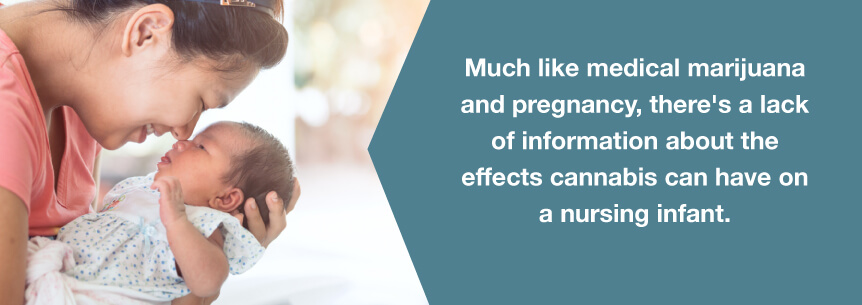
Breastfeeding is an infant’s best method of receiving the essential nutrition they need. It increases the health opportunities for the child, and mothers also receive benefits from breastfeeding their babies. However, some researchers fear that nursing infants will suffer many adverse side effects if the mother is breastfeeding them and ingesting cannabis.
Just like cannabis use during pregnancy, this issue has vocal dissidents on both sides. But the lack of concrete evidence that allows medical professionals to state that marijuana will hurt nursing infants unconditionally is lacking. Again, because cannabis is a schedule I drug in the United States, there haven’t been enough studies to reveal the truth one way or another.
It has been proven that the THC found in marijuana can get into a mother’s breast milk and thus is ingested by nursing infants. Breast milk contains a lot of fat because babies need it to grow and get proper nourishment. THC is a fat-soluble substance, which means it can be stored in fat tissue for quite some time. The more marijuana a nursing mother ingests, the more THC will be found in her breast milk.
The amount of THC transferred to nursing babies is not enough to get them high. However, the urine of these babies will test positive for marijuana for up to three weeks. This fact alone is enough to cause concern among medical professionals. On top of this though, some studies suggest that cannabis may create health concerns for both nursing mothers and their babies.
Mothers who use cannabis may have difficulties producing milk because it lowers levels of prolactin, the hormone needed for lactation. Some studies seem to show that marijuana-laced breast milk can lead to many issues in children, but the research is divided on this topic. Others studies show no effect at all. However, some of the symptoms present in infants that researchers have attributed to cannabis use in breastfeeding mothers include:
In addition, smoking, in general, has been linked to sudden infant death syndrome (SIDS). However, it’s known that breastfeeding lowers the risk of SIDS.
Most of the studies conducted regarding marijuana’s effects on nursing infants are dated. There have been very few studies within the past ten years, probably because it’s difficult to find pregnant or nursing mothers who will admit to using cannabis. Even though the plant has been legalized for medical use in more than half of U.S. states, they’re afraid of the implications their marijuana use will have for them.
If women felt more comfortable to admit to their cannabis use and more research were allowed within the country, the evidence would be able to support one view or another.
As it is, there are contradicting research studies when it comes to the effects of marijuana and THC on nursing babies. While some studies claim it has harmful consequences and can cause potential long-term damage to the developing baby’s brain, other reports state the exact opposite. Numerous studies and anecdotal accounts show that marijuana use has no apparent effects on infants and that every aspect of their development was normal, including:
An issue with all these research studies, which substantiate both sides of the matter, is that there was very little follow-up done to see how these babies progressed later on in life. This lack of information means that there are no reports that speak to the child’s development past infancy.
All new mothers want what is safest for their baby. The evidence is overwhelming that breastfeeding is the best possible option available for the health and nutrition of newborns. However, you may be concerned that your medical marijuana use is harming your child. Although there’s evidence on both sides of the issue, the final decision is up to you and your partner. You should come to a conclusion based on what you feel is best. However, you may want to consider a few things.
If your cannabis use impairs your ability to think clearly or affects your mood, judgment or perception in any way, you should definitely take it into consideration. During this time, your baby is completely dependent on you. If medical marijuana affects your ability to care for them, you may want to reconsider the amount or type of cannabis you’re using.
If you do decide to use medical marijuana while breastfeeding, be sure that you’re not smoking around your baby, or choose another ingestion method, like tinctures or edibles. Smoking of any kind is linked to increased risk of conditions like SIDS and childhood asthma.
Although most medical professionals will tell new mothers to stop cannabis use altogether if they’re planning on breastfeeding their child, others advocate a more nuanced approach. Because research has not yet determined the tipping point between harmful and non-harmful marijuana use, these experts suggest limiting cannabis use while breastfeeding. As opposed to a complete ban, which could be detrimental to some mothers, the use of cannabis could be minimized instead. Also, they should limit an infant’s exposure to the plant.
The most important consideration that pregnant and nursing women should make before using medical marijuana is speaking to their doctor. Although most physicians will advocate for these women to completely stop their marijuana use, a growing understanding of the benefits of cannabis is spreading throughout the medical community. Many doctors in states where medical marijuana use is legalized — and even in those where it’s not — have researched this topic and gained a fuller understanding.
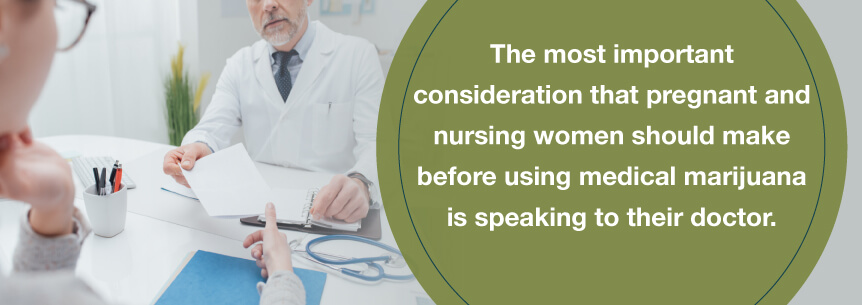
If you’re taking medical marijuana for a serious condition, it may be harmful for you to stop cold turkey. You and your doctor should come up with a plan of action. Tell them your concerns, and they can help you make this important decision.
If you would like the advice of a knowledgeable marijuana doctor in your state, search our database of qualified physicians. They’re not only professionals with the training to help you make critical medical decisions, but they also have a broader understanding of the intricacies of marijuana use and its effect on the human body.
No Information on MarijuanaDoctors.Com should be used to diagnose, treat, prevent or cure any disease or condition. You can view our Full Disclaimer here.